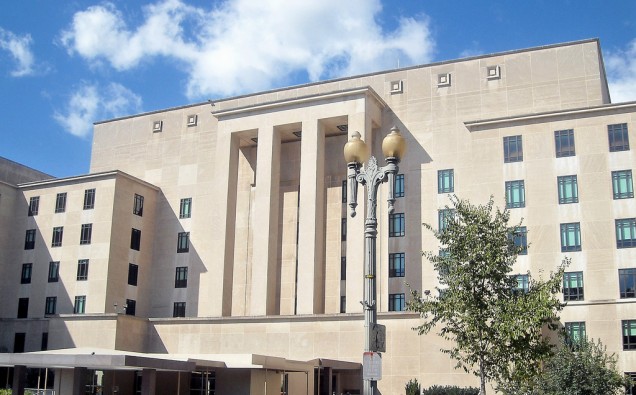
The United States has asked Islamabad to act against terrorist groups targeting its neighbors and not just the ones that pose a threat to Pakistan.
“We have been very clear with the highest levels of the Government of Pakistan that they must target all militant groups and that includes those that target Pakistan’s neighbours,” Deputy spokesman at the State Department Mark Toner said Thursday.
“…They’re going after groups, but selectively. We need to see them go after all groups and as I just said, even those groups that might not threaten Pakistan itself but threaten its neighbors,” he said.
The US comments came after Pentagon said this week that it is withholding release of $300 million in reimbursement to Pakistan because Secretary Defense Ashton Carter is not able to certify to Congress that Islamabad is acting effectively against the Haqqani network, part of the Afghan militants.
The Obama administration wants to show progress towards Afghan stability, 15 years after the US invaded Afghanistan in the immediate aftermath of 9/11 terrorist attacks perpetrated by Afghanistan-based al-Qaeda.
Meanwhile, Afghanistan remains mired in a labyrinth of corruption, incompetence, political wrangling, the Taliban insurgency and regional security strife with both Pakistan and India vying for influence in the landlocked country, linking South Asia to Central Asia.
At the State Department briefing, the spokesman acknowledged Pakistan’s efforts but said Washington wants to see Islamabad do more.
“We obviously believe that Pakistan needs to do all it can to confront all terrorists operating on its soil. We have seen it make progress; we want to see more progress on its part,” Toner said, when asked about Indian Home Minister Rajnath Singh’s visit to Islamabad for the SAARC meeting.
“We believe that Pakistan has taken and is taking steps to counter terrorist violence and certainly focusing on those groups that threaten Pakistani or Pakistan’s stability,” he said.
The spokesman declined to answer a question directly on the Defense Department’s decision to halt payment of $ 300 million in Coalition Support Funds aid to Pakistan.
On part of the State Department, Toner aid, “We continue … to provide assistance to the Pakistani people, and some of that does include security assistance.”
Meanwhile, in South Asia Islamabad and New Delhi exchanged tense verbal attacks, with each accusing the other of involvement in terrorist activities, as witnessed during a regional SAARC meeting in Islamabad.
Pakistan has long accused New Delhi of stoking a low-intensity insurgency in Balochistan. Recently, Pakistan has also accused India of perpetuating its state terrorism in the disputed Kashmir region, which has plunged into violence with loss of more than 40 civilians protesting Indian forces’ brutal use of force. India, on the other hand, accuses Pakistan of involvement in terrorist incidents in the country, and has tried to frame the Kashmiri protest demonstrations as foreign-backed militancy.
Islamabad’s relations with Kabul are also stuck in a spate of controversies. Kabul believes that Haqqani network operates out of Pakistan and makes it much more difficult for Afghan forces to contain the Taliban insurgency.
Pakistan, has long accused Kabul of harboring militants inflaming insurgency in Balcohstian, while Mullah Fazlullah, the leader of Pakistani Taliban, which has been fighting Pakistani state for several years, is also hiding in Afghanistan.
Critics of the US policy in Afghanistan have also questioned the approach to the regional issues. Recently a top Republican senator said the US, Pakistan and Afghanistan should work cooperatively to fight terrorism.
“Despite this and other recent difficulties, the US and Pakistani leaders cannot allow ambivalence and suspicion to fester. Common interests in counterterrorism, nuclear security and regional stability are too important and too urgent,” Senator John McCain, chairman of the Senate Committee on Armed Services, wrote last month after a visit to Pakistan.
In an opinion piece in The Financial Times, McCain US relationship with Pakistan should not be through Afghan security lens.
“To achieve real progress, the US must make clear its enduring commitment to Pakistan’s stability and economic growth.”
For its part, the US Administration has been urging cooperative ties between Pakistan and its neighbors and this week designated designated Jamaat-ul-Ahrar, a splinter group of Tehrik-e-Taliban Pakistan, as Specially Designated Global Terrorists. Based in the Afghanistan-Pakistan border region, the group was responsible for the killing of two Pakistani employees of the U.S. Consulate in Peshawar in early March 2016, and also carried out Easter Sunday attack in Lahore, killing 70 civilians.
Washington also asks Pakistan and India to fight terrorism.
“We encourage that kind of regional dialogue regarding counter-terrorism efforts. We advocate for closer cooperation, certainly, between India and Pakistan to deal with terrorist threats in both countries,” Toner said this week at the State Department.


















